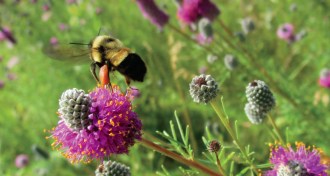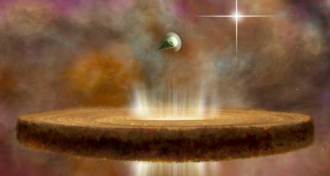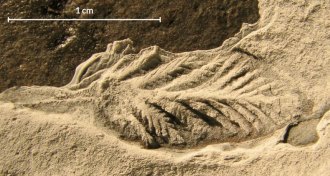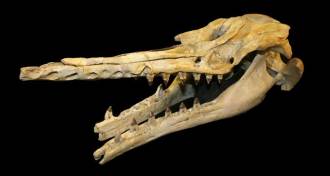Uncategorized
-
 Psychology
PsychologyHow string quartets stay together
New data tracking millisecond-scale corrections suggests that some ensembles are more autocratic — following one leader —while other musical groups are more democratic, making corrections equally.
-
 Ecosystems
EcosystemsDo your bit for bumblebees
The Xerces Society for Invertebrate Conservation and its partners have launched the Bumble Bee Watch website to track sightings. When you see a bee bumbling around, snap a photo.
-
 Science & Society
Science & SocietySlight boost for U.S. climate research funding
While most science funding remains flat lined in President Obama’s 2015 budget, climate change research gets an increase.
By Beth Mole -
 Materials Science
Materials ScienceWorld’s thinnest material stretches, bends, twists
Graphene, the thinnest known material at one carbon atom thick, can be manipulated under the microscope using tricks from a variety of paper-cutting origami called kirigami.
By Andrew Grant -
 Astronomy
AstronomyMature galaxies found in young universe
Inactive galaxies the size of the Milky Way found dating to when the universe was just 1.5 billion years old.
-
 Life
LifeThe Monkey’s Voyage
By 26 million years ago, the ancestors of today’s New World monkeys had arrived in South America. How those primates reached the continent is something of a conundrum.
By Erin Wayman -
 Astronomy
AstronomyBehemoth star destroys potential solar systems
A massive star in the Orion Nebula is evaporating disks surrounding young stars in its neighborhood but some disks mysteriously manage to survive.
-
 Archaeology
ArchaeologyRoman gladiator school digitally rebuilt
Imaging techniques unveil a 1,900-year-old Roman gladiators’ training center that’s buried beneath a site in Austria.
By Bruce Bower -
 Chemistry
ChemistryMilk protein a potential flame retardant
Protein found in milk offers a nontoxic way to extinguish fabric fires.
By Beth Mole -

-
 Health & Medicine
Health & MedicineExperimental drug might get the salt out
Tests in people and rats show sodium levels in blood drop as drug candidate limits the body’s salt absorption.
By Nathan Seppa -
 Paleontology
PaleontologyFossil whale skull hints at echolocation’s origins
Ancestors of toothed whales used echolocation as early as 34 million years ago, analysis of a new fossil skull suggests.